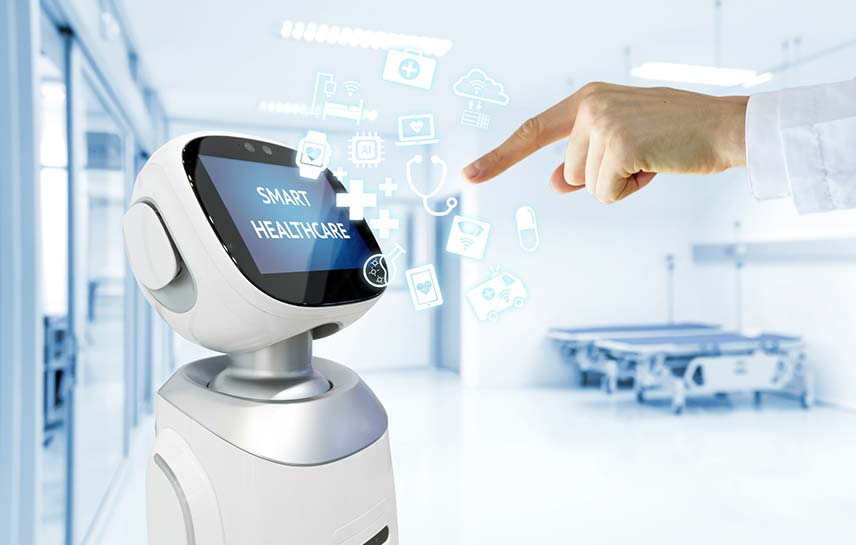10 Examples of Artificial Intelligence in Healthcare

March 9, 2023 by Medigroup
For a hundred years, Hollywood has been making sci-fi films about Artificial Intelligence (AI) robots causing havoc. The reality of AI is actually much more impressive and useful. It’s revolutionizing modern technology and business with far-reaching positive impacts.
AI is used in healthcare to develop more accurate diagnostic tools and treatment plans. It can automate mundane tasks and provide personalized care to patients.
Here, we explore examples of artificial intelligence in healthcare and how it’s transforming patient care. Keep reading to gain a better understanding of its uses and potential.
Examples of Artificial Intelligence in Healthcare
Below are some categories of healthcare where we’re seeing a lot of AI advancements. In each category, there are several areas where Artificial Intelligence is saving time or money. It’s also proving to be more accurate and catches information that humans may miss.
Diagnostic Tools
There are a number of different diagnostic tools that are used in healthcare, and many of them are now powered by AI. One example is the use of AI to interpret medical images. This can be used for things like CT scans and X-rays, and it can help to identify problems much faster than traditional methods.
AI for diagnostics is also being used to evaluate patient charts and data collected during visits. This can be used to spot trends and patterns that may indicate a particular condition or disease. The information can then be used to make more informed decisions about diagnosis and treatment.
Drug Development
The development of new drugs is a long, complicated, and expensive process. The use of AI in drug development is still in its early stages, but the potential benefits are clear. With AI, new drugs can be developed faster and at lower costs.
The traditional method of drug development involves multiple steps. It includes identifying targets, synthesis of new compounds, testing, and clinical trials in humans. AI is speeding up target identification and compound synthesis.
In addition, AI can be used to analyze data from animal studies and clinical trials more quickly and accurately than traditional methods.
Imaging Software
Imaging software is one of the most commonly used applications of artificial intelligence in healthcare. AI-powered imaging software can help doctors quickly and accurately identify diseases and disorders, as well as help plan treatment strategies.
One example of how AI is being used in imaging software is in the development of 3D medical images. Using data from multiple 2D images, AI algorithms can create realistic 3D images of organs and other structures inside the human body. This can be useful for planning surgeries, as well as for providing patients with a better understanding of their condition.
Another example is in the area of X-ray interpretation. With the help of AI, X-ray images can be automatically interpreted and analyzed for fractures or abnormalities. This can help to speed up the diagnosis process and improve patient care.
Patient Monitoring and Alerts
Patients are always encouraged to take an active role in their wellness and AI can help with that as well. Using AI technology allows for early detection of issues and potential problems or changes in their health even without a visit to the doctor.
Wearable devices like smartwatches and health trackers are good examples of artificial intelligence in healthcare at home. The devices monitor information about heart rates, stress management, and sleep patterns. The information can be used to relay information and detect changes or irregularities.
Doctors and patients can work together to create personalized alert settings based on the issues they’re trying to address. When a change or problem is indicated, AI can notify the patient and schedule appointments with the practitioner’s office. It can also advise the doctor about potential treatment courses based on the data and calculations.
Virtual Assistants
Virtual assistants are computer programs that can perform tasks such as making appointments, providing information about medical conditions, and even giving reminders about taking medications.
Google Now and Alexa are examples of virtual assistants that many people have access to. These programs can provide information about nearby hospitals, pharmacies, and doctors’ offices. They also:
- Find medical information online about symptoms and diseases
- Offer advice on implementing treatments
- Suggest doctors in the area
- Keep track of medications and their schedules
- Provide reminders for medications and appointments
Virtual assistants provide patients with convenient access to information and care with fewer in-person visits. This can help to save time and money for both patients and healthcare providers.
Medical practitioners’ offices use virtual assistants as well. In this capacity, the AI streamlines a multitude of tasks:
- Send reminders and confirmations to patients
- Maintain office schedules
- Handle most incoming patient inquiries
- Manage automated billing and payments
- Access the patient’s digital file for visits
- Alert the doctor to any new changes in the patient’s files
- Send prescriptions to the pharmacy
Using virtual assistants for some of the tasks in the doctor’s offices saves valuable time for staff to focus on things that need
Closing Thoughts
As you can see, there are many examples of artificial intelligence in healthcare. AI is revolutionizing the medical industry for care providers and patients.
It’s providing doctors with new tools to diagnose and treat diseases. It’s analyzing images of the human body to look for signs of disease and creating personalized treatment plans. It’s helping develop new drugs and making it possible for patients to get access to better care.
AI is also helping to make the medical industry more efficient. This allows human doctors and nurses to focus on the patient.
Contact MediGroup to learn about solutions that are right for your office.















